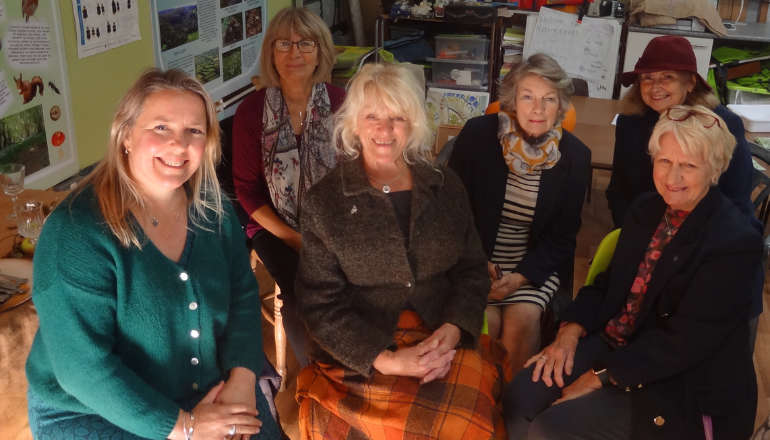Female prisons have a self-harm rate 8.5 times higher than male jails, as women experience a lack of "basic care" - including a "bizarre rule" that bans them from putting dirty underwear in washing machines.
In a report published following a review of four female jails, chief prisons inspector Charlie Taylor said this lack of "basic care" is causing such distress that inmates are resorting to harming themselves.
None of the prisons allowed women to wash their dirty underwear in a machine - instead they had to wash it by hand in a small bowl in their cell. This was an issue not found in men's prisons, and women described this as "disgusting", said the report.
"I wash all my socks and underwear in the same bowl, but you only get one bowl and on a weekend, you get your razor," one woman told inspectors.
"So, you got to do everything [referring to shaving, washing up and cleaning underwear] in that same bowl, so for me, that's a lot, its unhygienic."
Prison leaders told inspectors this "bizarre rule" is set to be changed.
Women also described not being given access to enough pairs of underwear - one inmate said she arrived with only one pair of knickers. She was forced to handwash them every night for months as no spare pairs were available.
When women were given prison-issued clothing, it was designed for men. They were also unable to access essential items, including toothpaste. In one prison, there was no footwear available in sizes four to six, the most common sizes for women.
The report found that in 10 years (from 2013 to 2023), the rates of self-harm in women's prisoners rose from 1,545 to 5,624 per 1,000 prisoners.
Given the high rates of self-harm, access to razors to shave was limited, even if women were not deemed to be at risk.
'Vicious cycle'
The review found many prison officers are inexperienced and end up in a "vicious cycle" of helping women in crisis, which means they cannot provide support to other prisoners to stop them from deteriorating.
Measures, such as physical restraint and constant supervision, for those who were acutely unwell were considered "too common" by inspectors.
Jailed far from home
The report also found shortcomings in opportunities to allow women to stay in contact with their loved ones - visits were found to be too short, and phone credit often not available in the first few days in prison.
The watchdog found support was "far more limited" compared to men's prisons, despite a higher level of need.
"In three of the four prisons we visited, about a third of the women were over 50 miles from home and at one of the sites it was over half (data was not available at one of the jails)," the report said.
"Additionally, about a third of all women did not receive face-to-face visits. Leaders were not doing enough to promote contact and make visiting easier: some visit sessions only lasted 60 minutes and at one site they only ran during the afternoons."
"Family days" were found to be shorter than those that took place at men's prisons. While men had options including 'stay and play' sessions, homework clubs and cooking activities, these options were not found in any of the female prisons visitors expected, something they deemed "concerning".
Read more:
Kay Burley leaving Sky News
Nottingham families react to damning NHS report
Trump's Gaza plan 'outrageous'
'A wake-up call'
Reacting to the watchdog's report, Nicola Drinkwater from the charity Women in Prison, said its findings lay bare the traumatising environments in prison that worsens women's mental ill-health, leading to "alarming levels" of distress and self-harm.
Justice Secretary Shabana Mahmood responded to the report, branding it "shocking" and a "wake-up call".
"Many female prisoners are victims and over half are mothers. For most women, the prisons this government inherited are not working," she said.
The Women's Justice Board, which met for the first time on 21 January, will focus on early intervention as well as addressing issues specific to pregnant women, young mothers and mothers of young children in the criminal justice system.

(c) Sky News 2025: Women prisoners banned from putting dirty underwear in washing


 Families of Nottingham attack victims say new review shows killer should face murder retrial
Families of Nottingham attack victims say new review shows killer should face murder retrial
 Kay Burley retires from Sky News after 36 years
Kay Burley retires from Sky News after 36 years
 Axel Rudakubana's anti-terror referral should have been kept open, review finds
Axel Rudakubana's anti-terror referral should have been kept open, review finds
 Swedish gunman appears to have shot himself, police say - but motive still unclear
Swedish gunman appears to have shot himself, police say - but motive still unclear
 Ozzy Osbourne to reunite with Black Sabbath for 'final bow' performance
Ozzy Osbourne to reunite with Black Sabbath for 'final bow' performance



 Three-Bed House Could Be Built Within Grounds Of Neglected Ventnor Hotel
Three-Bed House Could Be Built Within Grounds Of Neglected Ventnor Hotel
 Warning Issued Over Smart Pass Scam
Warning Issued Over Smart Pass Scam
 National Lottery Heritage Fund awards Naturezones Wildlife Education Trust £72,400
National Lottery Heritage Fund awards Naturezones Wildlife Education Trust £72,400
 Man Charged As Part Of Child Sex Offence Investigation On The Isle Of Wight
Man Charged As Part Of Child Sex Offence Investigation On The Isle Of Wight